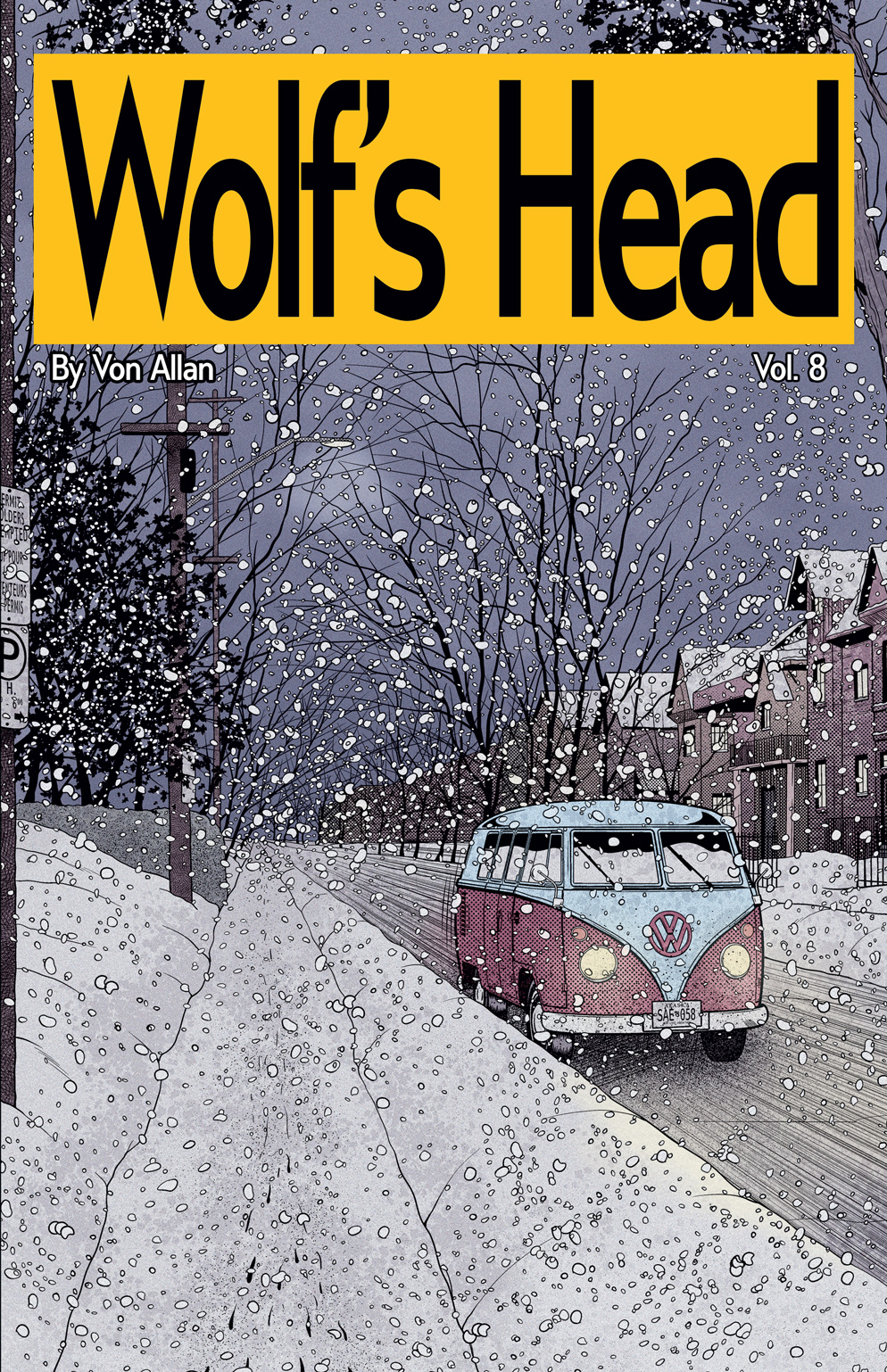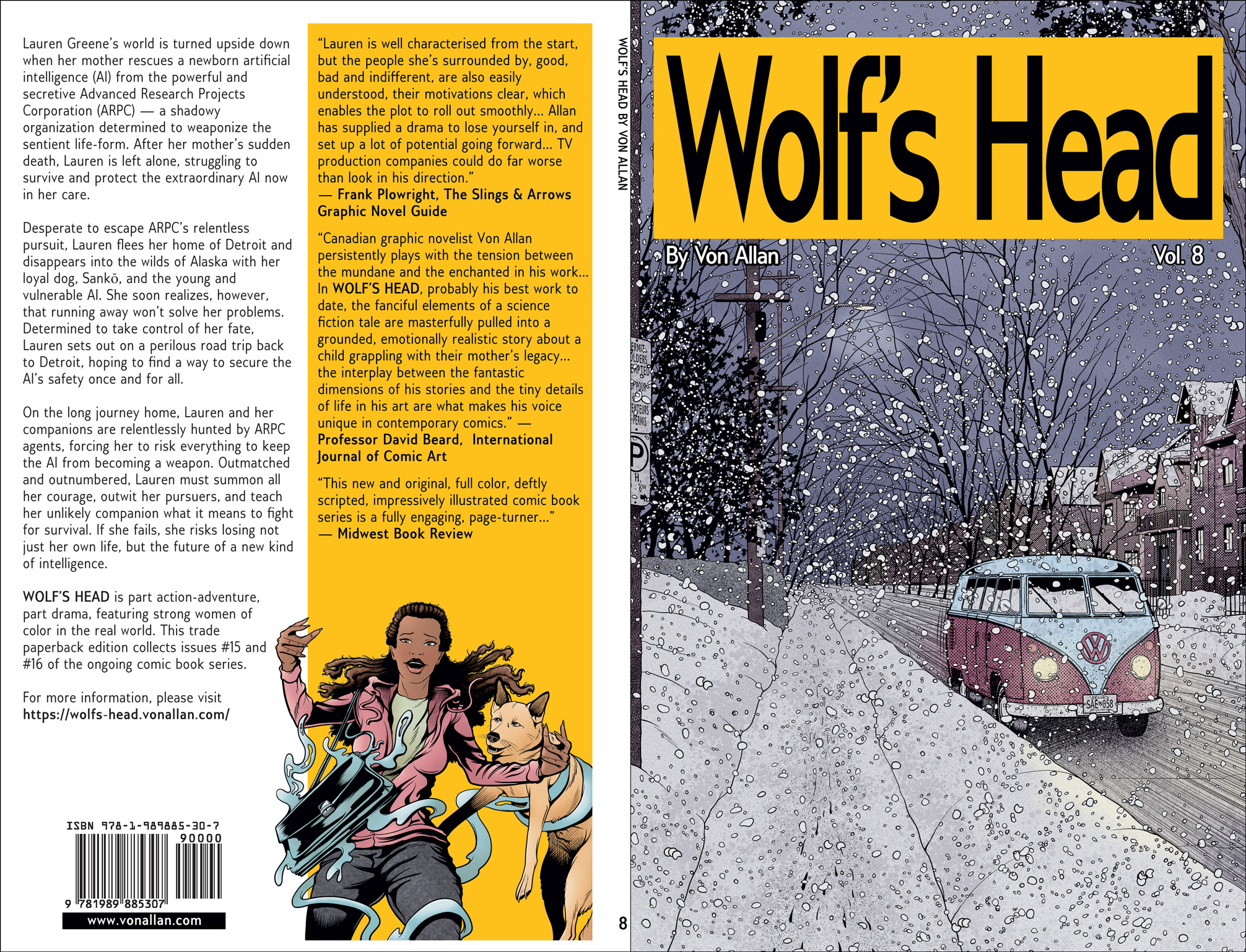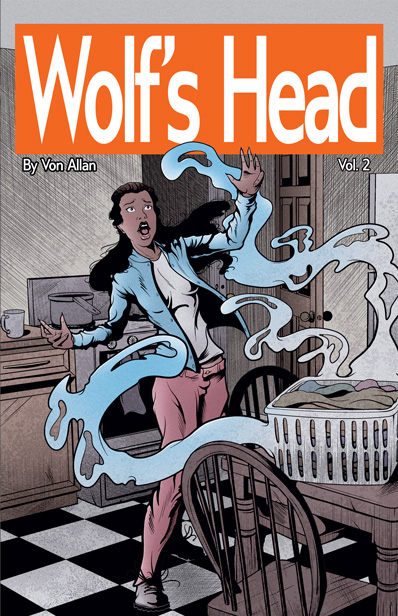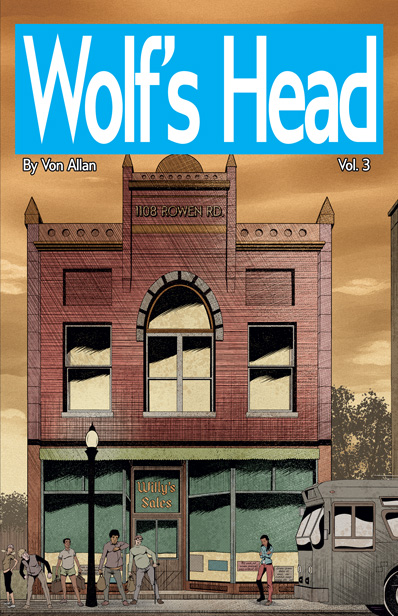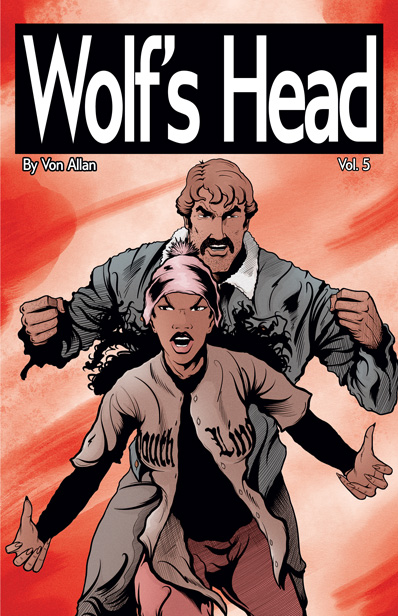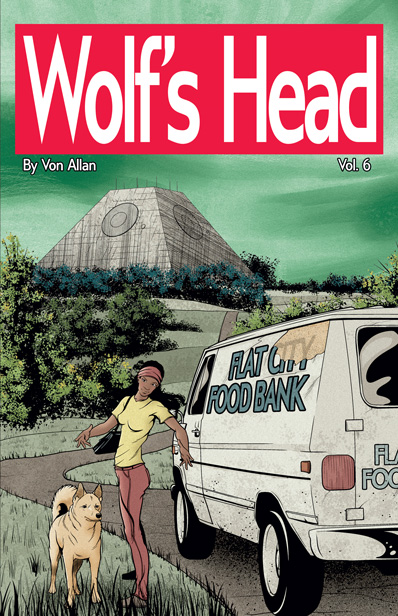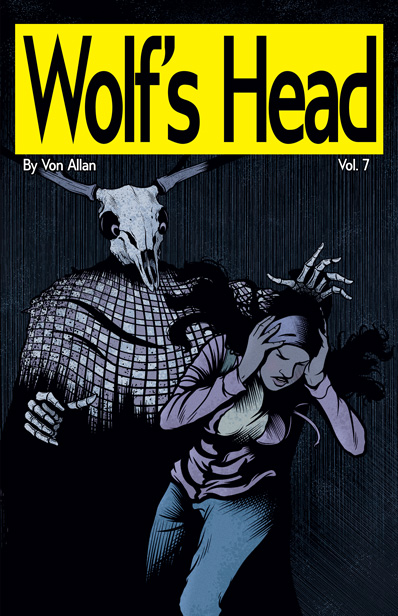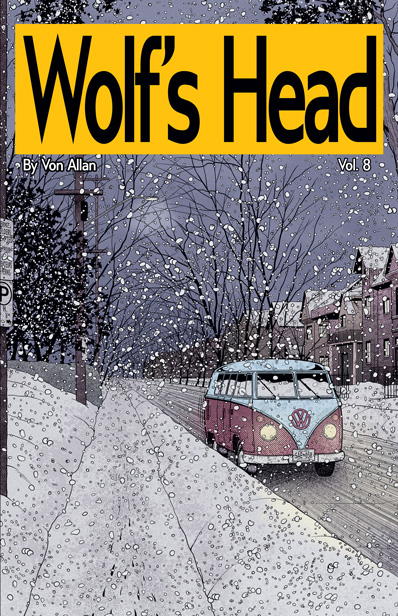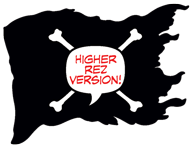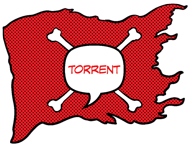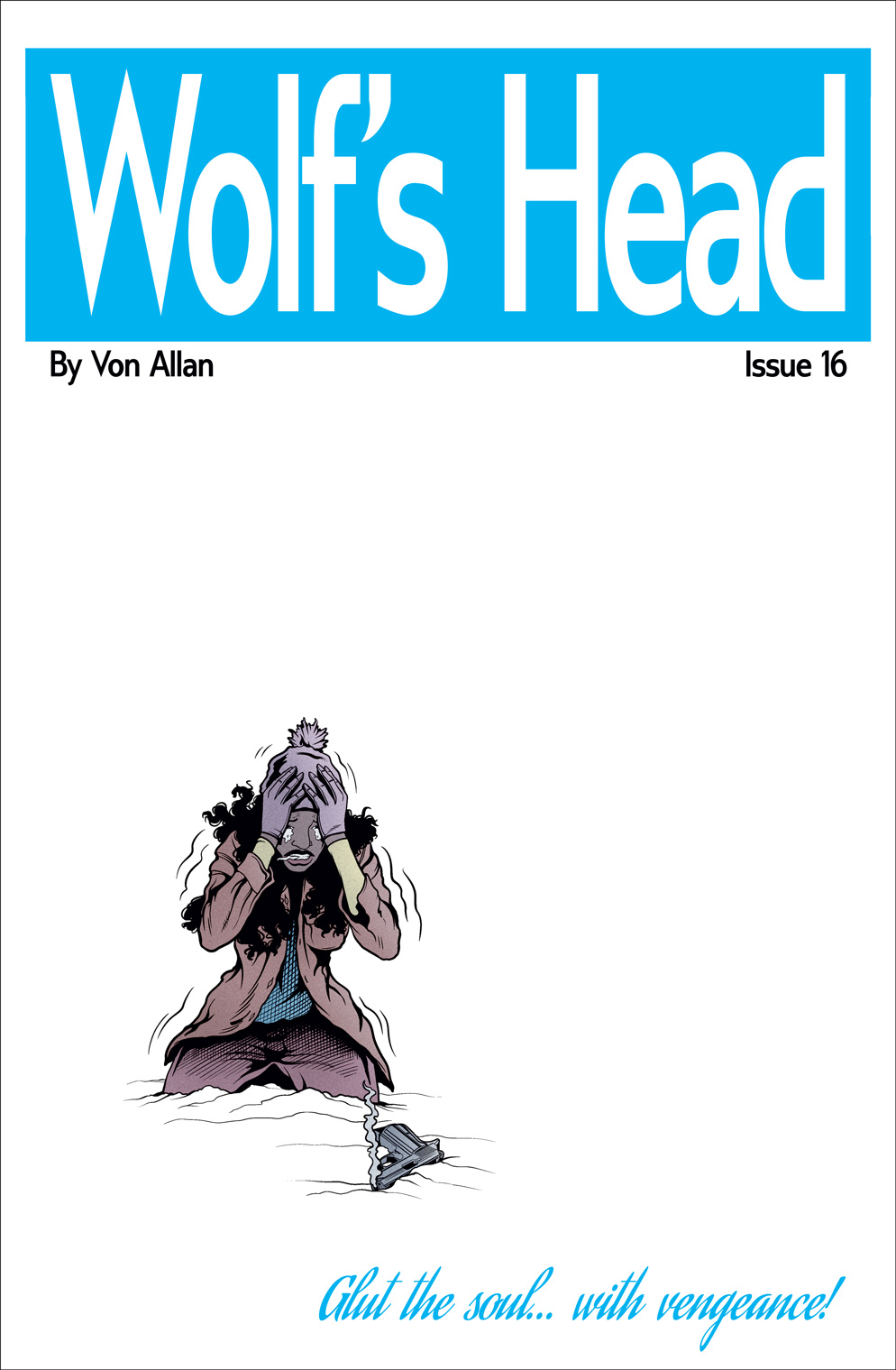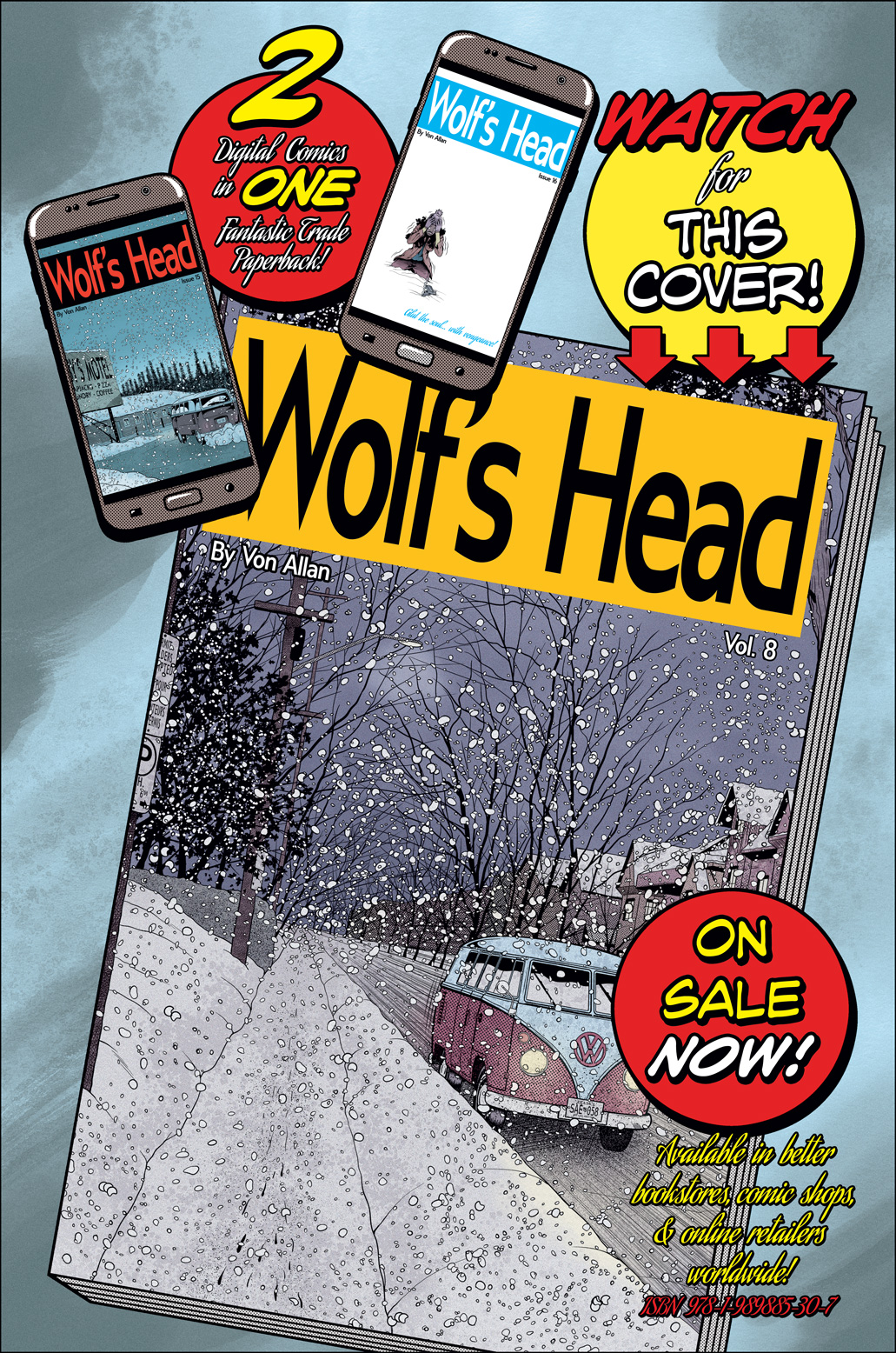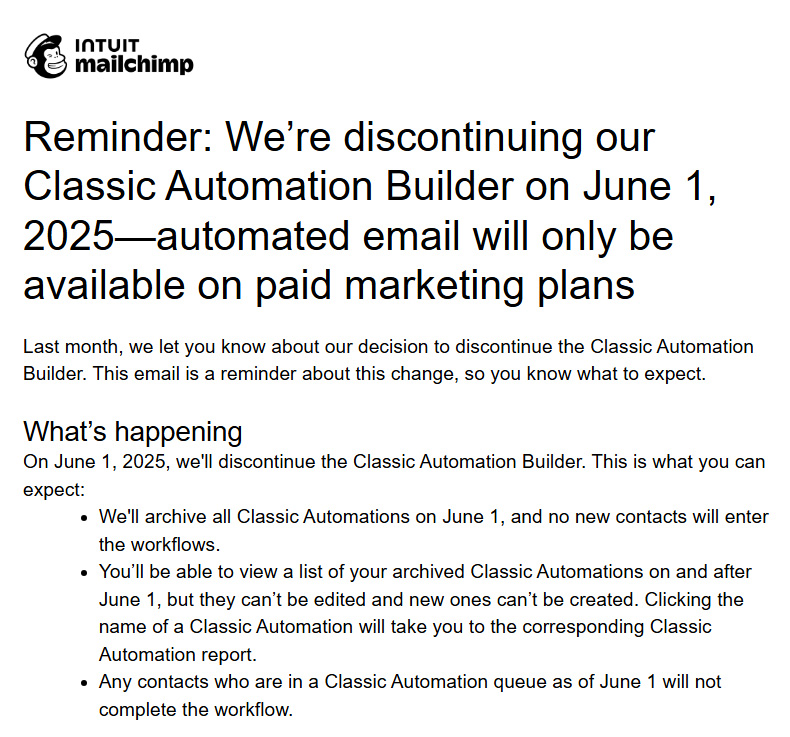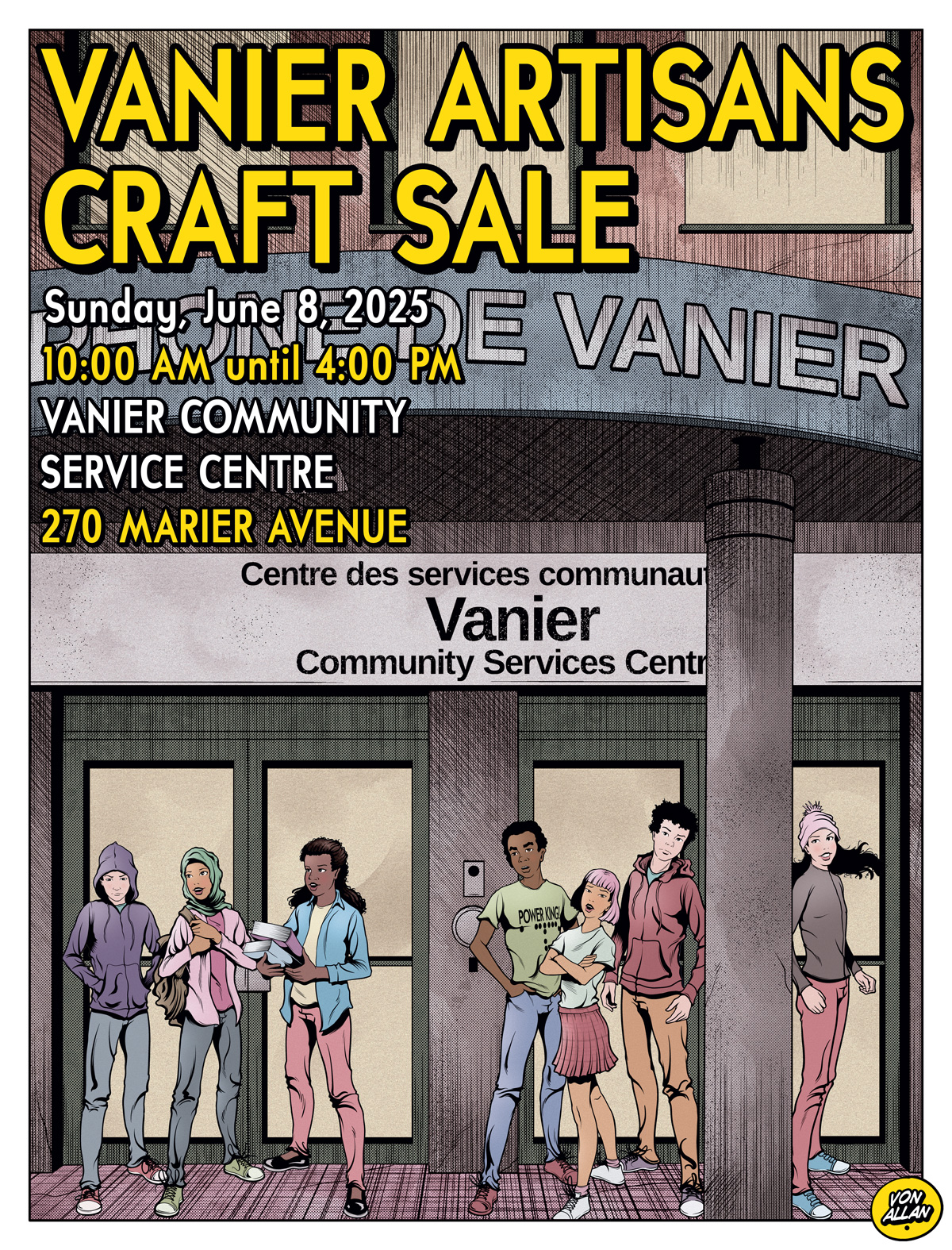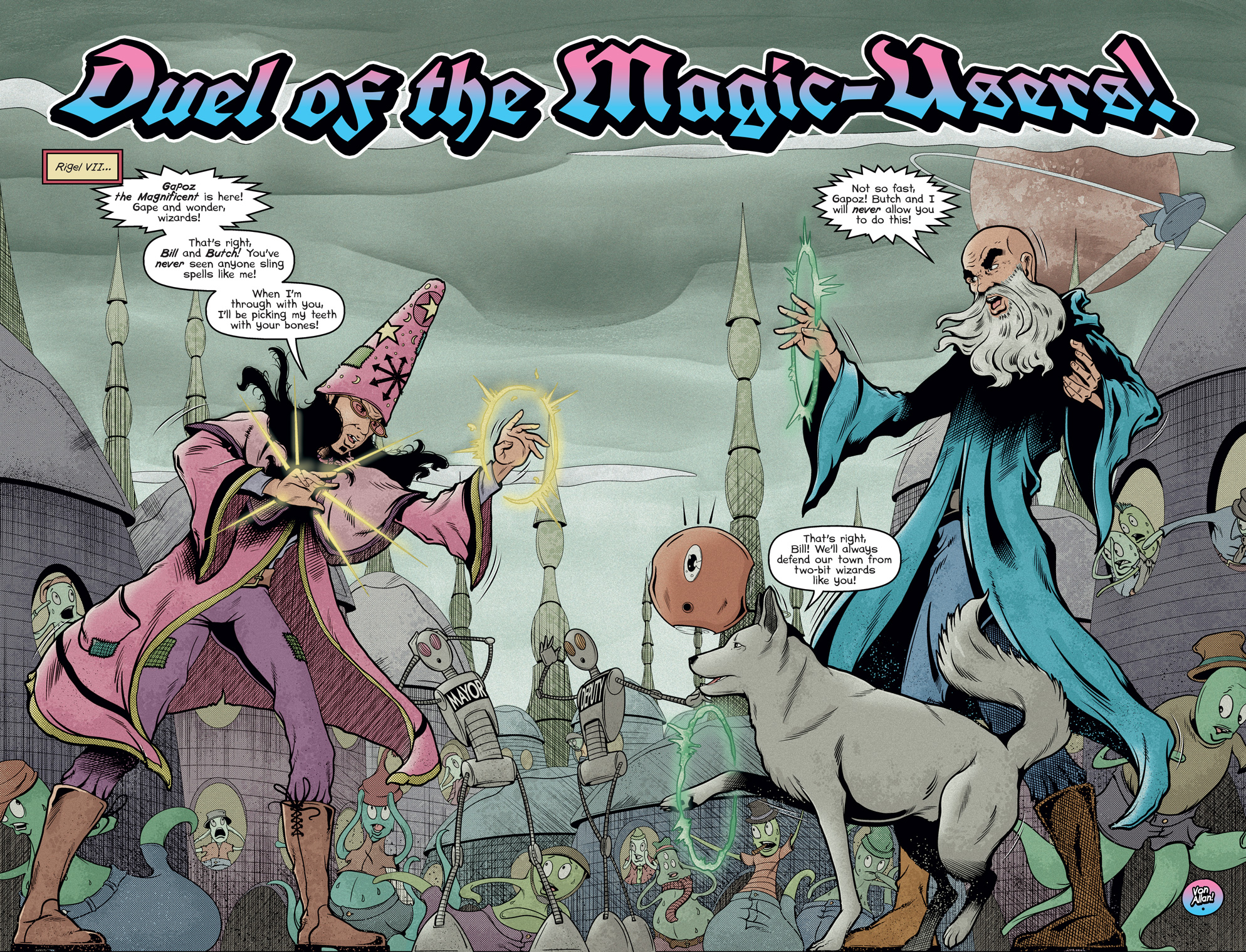Wolf’s Head Volume 8 in trade paperback format Worldwide (first-time ever)!
This a milestone! Due to more challenges than I can shake a stick at,1 the long-awaited Volume 8 of WOLF’S HEAD is now finally available! This volume features one of the most emotional twists I’ve done in the series so far, but one I think makes perfect sense.
As I previously noted, the first seven WOLF’S HEAD trade paperbacks are back in print in new editions, but with today’s release of Volume 8 (collecting issues 15 and 16 of the ongoing digital series) we are on brand new ground! As always, this is a full colour edition and is 60 pages in length. Haunted by loss, Lauren Greene and her loyal dog Sankō embark on a perilous road trip from Alaska to Detroit, outwitting ruthless corporate agents to protect a sentient AI child. Hunted at every turn, Lauren risks everything to keep the extraordinary life-form from becoming a weapon—and to safeguard the future of a new kind of intelligence.
- Amazon.com
- Amazon.ca
- Canadian Independent Bookstores (via BookManager)
- Amazon.co.uk
- Barnes & Noble
- Bookshop.org (and IndieBound)
- And on and on! Germany? You bet! What about Waterstones? Definitely! Again, you may need to ask your local bookstore and comic shop, but it is easily available everywhere!
As always, remember that I can’t control exactly when and where this volume will become available, but hopefully the above links are a good start. Be patient and don’t be afraid to ask your retailer for help! Volume 9 will be released shortly, either at the tail-end of 2025 or early 2026.
There is a dedicated website for WOLF’S HEAD at https://wolfs-head.vonallan.com/p/wolfs-head-landing-page.html with all kinds of additional information!
The Elevator Pitch
Lauren Greene’s world is turned upside down when her mother rescues a newborn artificial intelligence from the powerful and secretive Advanced Research Projects Corporation (ARPC) — a shadowy organization determined to weaponize the sentient life-form. After her mother’s sudden death, Lauren is left alone, struggling to survive and protect the extraordinary AI now in her care.
Desperate to escape ARPC’s relentless pursuit, Lauren flees her home of Detroit and disappears into the wilds of Alaska with her loyal dog, Sankō, and the young and vulnerable AI. She soon realizes, however, that running away won’t solve her problems. Determined to take control of her fate, Lauren sets out on a perilous road trip back to Detroit, hoping to find a way to secure the AI’s safety once and for all.
On the long journey home, Lauren and her companions are relentlessly hunted by ARPC agents, forcing her to risk everything to keep the AI from becoming a weapon. Outmatched and outnumbered, Lauren must summon all her courage, outwit her pursuers, and teach her unlikely companion what it means to fight for survival. If she fails, she risks losing not just her own life, but the future of a new kind of intelligence.
The WOLF'S HEAD Trade Paperback Series
Below is a listing of all the volumes of the series so far! If you click on the cover, it will bring you to a dedicated page for that volume on the WOLF’S HEAD subdomain. Again, most online retailers regularly stock and carry WOLF'S HEAD. However, occassionaly there are hiccups with this from time to time (typically because the retailer has had a little rush on sales!). So, if you were shopping on Amazon (for example) and discovered that a particular volume is out of stock, there are many alternatives. These include Barnes & Noble, Bookshop.org, Indigo, McNally Robinson, The American Book Center, Waterstones, and so on.Read for Free
As many of you know, I’ve also begun serializing the comic book series for free on the Internet Archive (https://www.archive.org) as part of my “Pirate Von” initiative. As I mentioned above, WOLF’S HEAD Volume 8 consists of issues 15 and 16 of the ongoing series. While you can find the links to both on the Internet Archive as well as the “Pirate Von” section of this very website, to make it easier the links to both issues 15 and 16 are below.Remember! If you enjoy them and would like a physical copy, you can purchase Volume 8 in stores — both online and off — around the world!
TEASER FOR WOLF’S HEAD Volume 8
And here’s a little teaser image to help cement the idea. Two digital comics inside one trade paperback volume!Other Links
- Overview of my Comics: http://www.vonallan.com/p/comics.html
- Wolf’s Head (My Ongoing Comic Book Series): https://wolfs-head.vonallan.com/p/wolfs-head-landing-page.html
- Von Allan Studio Shop Page: http://www.vonallan.com/p/von-allan-studio-shop.html
- RSS Feed: http://feeds.feedburner.com/Von_Allan_Homepage
- An explanation for why you never saw WOLF’S HEAD in Diamond's PREVIEWS: https://www.vonallan.com/2025/01/Diamond-Comic-Distributors-Wolfs-Head-and-Me.html
1 But what the hell! Let’s enumerate! Here goes: The pandemic (well, duh), Diamond Comic Distributors and their intransigence, Amazon’s decision to end ComiXology as a separate platform, rolling it into Kindle platform instead, the death of a dear beloved friend, health scares from other loved ones (and family drama), the utter collapse of Diamond and the resulting upheavels in the so-called Direct Market, Ingram Content Group’s apparent difficulties with “EDI” or Electronic Data Interchange and various retailers, not to mention the normal day-to-day challenges of life. Whew!
Announcements
Three quick announcements, folks!
The first is that the Vanier Artisans will be having a spring show here in Ottawa on Sunday, June 8th at the Vanier Community Services Centre at 270 Marier Avenue. The poster by yours truly is at the end of this post and the Facebook page just went up, too! I’ll be there along with a number of terrific artists! One of the things I really like about the Vanier Artisans is that a wide range of styles are represented. Knitted items, food items, painted items, soaps, photography, and comic books and graphic novels (me). In other words, there’s something for everyone. It is well worth your time, so if you have a chance, please check it out!
The second announcement has to do with MailChimp. I had mentioned that I’ve not been a particular fan of their service, especially when I compare it to the “good ol’ days” of FeedBurner. Coincidentally, MailChimp has taken the interesting decision to make their service, at least for people like me, measurably worse. The screencap below has all the details.
What does this mean for you? Well, for regular visitors of this site along with folks that are using RSS to subscribe to my periodic updates, not a thing. For those of you who have subscribed via email, there is a big change. Sadly, as of June 1st, that option is now over. That means that you’ll no longer be receiving updates via email from me. There are a few options going forward.
1) Switch from email updates to RSS. I’m a big believer in RSS. For most people, it is quick and easy to use and is a snap to set-up. You just need a RSS Reader (aka a “News Aggregator”) and these can be installed on pretty much any internet-enabled device (desktop computers, cell phones, tablets, you name it). The one I use is BetterBird, a much improved version of Mozilla’s Thunderbird (or as the BetterBird project notes, it’s a “fine-tuned version”) and is tremendous. There are a lot of other options out there, though. Some for free, some not. Wired did a good summary but a simple search using Google or DuckDuckGo or whatnot will turn many up. You may need to experiment, but it’s well-worth your time.
2) If you truly hate this idea and would prefer to keep receiving periodic emails from me, drop me an email (media@vonallan.com). I’m going to put together an HTML email mailer that will be similar to what you were already receiving. So if RSS isn’t an option for you for whatever reason, we can still do email, just not the way you’ve been receiving it via MailChimp or FeedBurner.
The third announcement is that the new Bill and Butch short story is finished (pencils, inks, colours, lettering, you name it!). I just need to do some proofing/edits and then it will debut right here, hopefully before June 1st so that MailChimp can send out one last email.
That’s it right now! I hope to see you on June 8th!
Forthcoming — A Brand New Bill and Butch Short Story
I thought I’d share a little teaser of an upcoming short story
—
a brand new Bill and Butch1
short story! These two crotchety
wizards have their fair share of fans who have been clamouring for
their return! And, I have to admit, I’ve been itching to write
and draw them again. As always, the main issue was time (too little
of it!) and other commitments (too many of ’em!). But I was
finally able
to figure out my schedule and work something out. The script is done
and the first two pages (a double page splash!) are complete. And,
with that in mind, I thought
it would be fun to share that splash with you. I’ve included
the pencils, too!
When will this little story be
available to read in full? Well, the short answer is “soon.”
The long answer? “Soonish.”
In other words, I’ll share it when its ready! In the meantime,
enjoy! UPDATE: It’s available now! Please visit
https://www.vonallan.com/2025/05/short-story-duel-of-the-magic-users.html
Oh,
and before I forget: Professor David
Beard from the University of Minnesota Duluth (he of the
incredible
awesome review of my work!) was lovely enough to do an interview
yours truly that is now available. Interestingly,
the interview touches on my very first graphic novel “the road
to god knows…”2
And even more interestingly, the interview appeared in the
PROFESSIONAL WRESTLING STUDIES JOURNAL Volume 4.03
(yes!), something that is fascinating to me. Why fascinating? Well,
that pro wrestling is an art form4
should really not be a surprise to anyone. And
that scholarly folks are studying it should also not be a surprise.
Sadly, like much of our
contemporary cultural touchstones, it is an artform dominated (at
least here in the West) by a couple of large corporations, but that
doesn’t undercut the fact that it is
an art form all the same. Now, it is an artform that —
in its current iteration —
I find myself largely
alienated from (partially due to the aforementioned corporations,
partially due to storytelling issues, and
partially due to the tremendous death toll that has taken too many
wrestlers), but pro wrestling
does have a lot to offer from a narrative and storytelling point of
view. Why am I saying this? ’Cuz storytelling and pro wrestling
is exactly what Professor Beard and I discuss. If you ever want a
glimpse into some of my approaches to storytelling (not,
I hasten to add, my
only approach)
this interview is a good overview.
As
Beard noted in his forward
to the Volume 4.0, “Von Allan never once depicts wrestling in
his comics, but in The Road to God Knows, the child in a family that
struggles with a parent’s mental illness escapes the sadness of
life by watching the action in the ring. I am touched, myself —
recognizing in The Road to God Knows the escape that professional
wrestling also brought me as a child.”
One last note. As some of you know, this site uses MailChimp to bring new posts and updates directly to your email box. However, I find the various restrictions that MailChimp has for creators pretty onerous and the service is (in my not so humble opinion) nearly as intuitive and easy as FeedBurner’s was back in the day. As a result, I may wind up discontinuing the service, but I want to do a bit more thinking on this before I come to any final conclusions. For those who subscribe this way, it might be a problem. I would gently suggest that a better way to go is with good old RSS and a handy RSS reader. At any rate, if I do discontinue it, I will be sure to give everyone fair warning first.
Onward to my art! These pages are larger than what they appear as below, so feel free to click on them to get larger versions (ahem, in all of their glory!).
1 For their other adventures, you can read them for free right here on this website. Here are the links: THE COWARDLY CLERICS OF RIGEL V, TOTAL PARTY KILL!, and THE PLANET WITH NO BEER. And if you enjoy them, please share them! Sharing is caring, after all.
2 Sadly, “the road to god knows…” is now out of print. For those who are interested in some of the background to why this is, please read this short essay (with loads of art!): On Getting Stronger.
3 The full journal is crammed with all kinds of delightful interviews and explorations, too. You can visit https://pressbooks.umn.edu/pwsajournal4/ and either read it online or download it in various formats, including PDF and EPUB.
4 There was a great website called “Pro Wrestling is Art” that delved into this quite a bit, but sadly it hasn’t been updated in many years. The archive is still available at https://prowrestlingisart.wordpress.com/ and is worth your time if you’re so inclined. Editor and lead writer Leslie Lee III also is one of the folks behind the podcast “Struggle Session.”
Love, Laughter, and Loss—A Comics Collection now available in Hardcover
This has been a long-time coming, but I’m very pleased to announce the publication of my latest comics collection! And, for the first time, this is a premium hardcover! Titled LOVE, LAUGHTER, AND LOSS: A COMICS COLLECTION, this edition features nine short stories in full colour. The printing and colour fidelity are top-notch; in fact, I don’t think my work has ever looked this beautiful.
These stories have appeared in print before, mainly in two separate periodical collections that are now out of print. The first periodical was titled WIZARDS FOR HIRE — CHEAP! while the second periodical was titled STORIES! 2015 TO 2019. While I was very happy to see these two editions published, keeping saddle-stitched editions in print was, frankly, a pain. Publishing LOVE, LAUGHTER, AND LOSS is a much better way of keeping them in print. On top of it, many of these stories were recoloured for this new hardcover. And that means a number of these stories have never looked this good before. Am I happy with it? Oh yes!
If you love comics, especially independent/small press comics, I think you’ll fall in love with this edition. I know I have — and that’s saying something!
Links to Purchase
LOVE, LAUGHTER, AND LOSS: A COMICS COLLECTION is still “propagating” out there, but here are some initial purchasing links that I know of for sure. More will be added as they appear.
- Amazon.com: https://www.amazon.com/dp/1989885160;
- Amazon.ca: https://www.amazon.ca/dp/1989885160;
- Amazon.co.uk: https://www.amazon.co.uk/dp/1989885160;
- Amazon.de: https://www.amazon.de/dp/1989885160;
- Amazon.fr: https://www.amazon.fr/dp/1989885160;
- Barnes & Noble: https://bit.ly/3fkS3Ca;
- IndieBound: https://www.indiebound.org/book/9781989885161
- Bookshop.org: https://bookshop.org/books/love-laughter-and-loss-a-comics-collection/9781989885161
- Bookfinder: https://bit.ly/2Rn9nhT.
Photos of the Graphic Novel!
Les lâches clercs de Rigel V
Ce qui suit est une expérience. Je suis un écrivain et un artiste de langue anglaise, ce qui m'irrite au plus haut point, d'autant plus que beaucoup de membres de ma famille sont originaires de la province canadienne du Québec et parlent couramment le français et l'anglais. Malheureusement, je suis unilingue anglais. Ce qui suit est une tentative de traduction d'une de mes bandes dessinées en français. Comme je ne parle pas français, j'ai dû utiliser des outils en ligne pour m'aider (principalement deepl.com et bonpatron.com). J'espère que la traduction est satisfaisante, mais n'hésitez pas à me faire savoir si je me suis trompé.
Maintenant que tout cela est réglé, c'est parti !
Wolf's Head Launches Today on Kindle
UPDATE! I have had to make the decision (reluctantly!) to pull the series off of the Kindle platform. Why? Well, the short answer is the changes that Amazon made to ComiXology, leading to the functional end of that platform and rolling digital comics into Kindle directly, created far more problems then I realized. The big problem was discovery; on ComiXology people could the series with little to no effort. Kindle was much, much worse. Even I had a hard time finding it when I used Amazon's search options. After doing everything I could think of to fix that, I realized it simply wasn't worth the effort.
Is that the end of the digital version of the series? Nope! I decided to go a completely different route and use the awesome tools at the Internet Archive to release the series for free to everyone! Please visit the Internet Archive or just use the handy links here: https://wolfs-head.vonallan.com/p/wolfs-head-landing-page.html.
I'll leave the Kindle announcement below for posterity's sake, but I'll probably remove this post entirely in the not-too-distant future.
The original announcement!
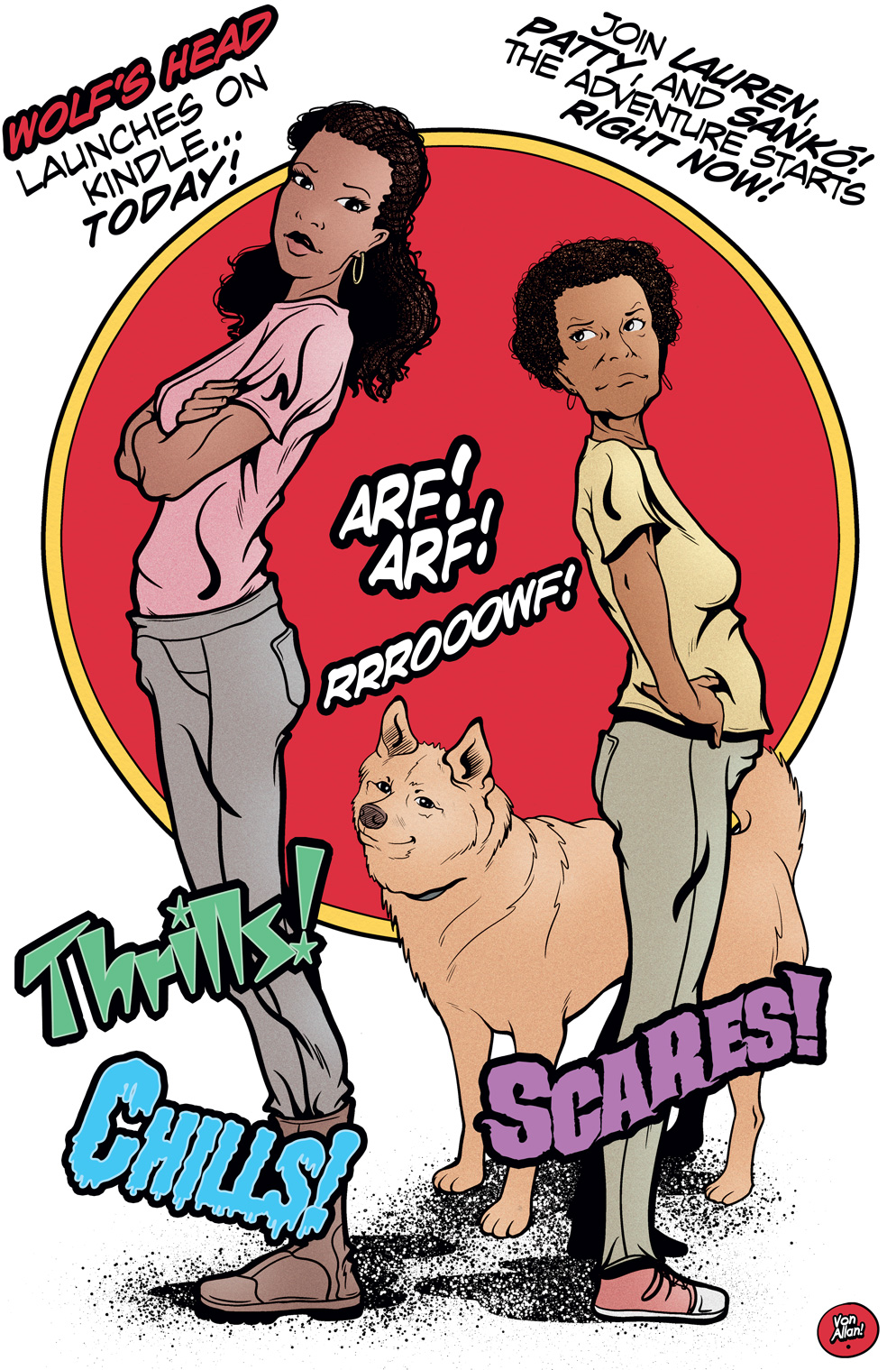 I'm very pleased to announced that the digital comic book version of WOLF’S HEAD has now launched on Kindle. The link to the first issue is at https://www.amazon.com/dp/B089V1DVY7
I'm very pleased to announced that the digital comic book version of WOLF’S HEAD has now launched on Kindle. The link to the first issue is at https://www.amazon.com/dp/B089V1DVY7I should add that Kindle has received and approved issues 2 through 10, so I expect that subsequent issues will be released regularly. The link to the series is at https://www.amazon.com/dp/B08MTGCS49
What's it about? WOLF’S HEAD is the story of Lauren Greene, a young woman who quits her job as a police officer in Detroit and consequently struggles to pick up the pieces and find her place in society. After her mom makes an astounding discovery at a research facility, Lauren must fight for their lives against forces that will stop at nothing to stop them. I think the series is a great deal of fun and also contains the best writing and comic book art I've ever created.
The print editions of WOLF’S HEAD have been making their way to bookstores and comic book shops (both online and off) for awhile now, but this is the first time that WOLF’S HEAD will be available in a digital version. For those who don't know, each volume of the print version contains two issues (making each volume approximately 60 pages in length). The digital version is a single issue and that means the page count for each digital issue is approximately 25 to 30 pages in length.
There's a dedicated website for the series at https://wolfs-head.vonallan.com/. This site includes previews, frequently asked questions, a complete media kit, links to the print editions, and more! https://wolfs-head.vonallan.com/ will also be updated in the near future with Kindle links to each issue, too.
I think that covers it! I'm very pleased to have WOLF’S HEAD out in this format. It's going to be a great deal of fun to have the series roll out on Kindle. Come with me, won't you?
ComiXology Release - "Wizards for Hire - Cheap!"
I'm very pleased to announce that WIZARDS FOR HIRE - CHEAP! is now available on Kindle using the following link:
https://www.amazon.com/dp/B089QXBYY9/
One of the things I really love about the Kindle is their "panel by panel" guided view. It makes reading comics on a small device (such as a cell phone or a small tablet) really easy and intuitive - and fun!
For those on the fence, please don't forget that you can read all of the stories in WIZARDS FOR HIRE - CHEAP! for free right here on this website, in webcomic format. The links are as follows:
"The Cowardly Clerics of Rigel V" - https://www.vonallan.com/2017/08/short-story-cowardly-clerics-of-rigel-v.html
"Total Party Kill!" - https://www.vonallan.com/2017/08/short-story-total-party-kill.html
"The Planet With No Beer" - https://www.vonallan.com/2017/08/short-story-planet-with-no-beer.html
For the Kindle collection, I also included the bonus short story "The Two Magic-Users" which can be read at https://www.vonallan.com/2019/04/the-two-magic-users.html
All in all I think this is a great package of short stories at a very affordable price! For those looking for a print copy, there is bad news (boo!) and good news (yay!). First, the bad news: the original print edition comic of WIZARDS FOR HIRE - CHEAP! is out of print, though you can still find copies in a few places. Now, the good news: all of these stories plus a number of others are now in a beautiful deluxe hardcover edition titled LOVE, LAUGHTER, AND LOSS: A COMICS COLLECTION. More information about this hardcover can be found here or by visiting the studio's shop page. I'm really pleased with this version and a hardcover edition ensures that these stories will be widely available for quite some time!
Panel Discussion from 2018 Low-Beer Memorial Lecture
The panel discussion was moderated by the always awesome Loreen Pindera from CBC Montreal and featured Megan Durnford (the film's writer and director), Rebecca Heinisch, Marie Leavens, and myself. AMI Quebec's Dr. Ella Amir added closing comments. It took a little while, but I'm very pleased to announce that the audio recording of the panel discussion from the panel discussion is now available! Yeah!
The MP3 can be played directly in your browser at http://vonallan.com/Audio/Low-Beer-Memorial-Lecture-September-27-2018.mp3. You can also directly download the MP3 by right clicking on the link and choosing "save as" (or whatever is appropriate in your browser).
It can also be played in the audio player below:
Lightly Edited Transcript
Loreen Pindera: Introduce yourself.
Megan Durnford: I’m Megan, the writer and director of the film [“I Am Still Your Child”].
Marie Leavens: I’m Marie Levens. I’m Sarah’s mother.
Rebecca Heinisch: Hi, my name is Rebecca Heinisch. I’ve been working with children who have parents suffering from mental illness for the past, I would say, 14 years. I wrote a children’s book to help children better understand what is going on in their families when the parent is ill. And I’ve also, with my husband, founded a non-profit organization and we run programs for these children. And they’re for children between the ages — the program’s between the ages of 7 and 17.
Loreen Pindera: And Marie would like to say something about that program.
Marie Leavens: Sarah is actually part of that program when she was 8 years old and it really, really helped her.
Rebecca Heinisch: Thank you.
Loreen Pindera: I have… I think you can hold off on the applause till the end now. Or we’re going to get really tired.
It’s the third time I’ve watched the film now in the last few days. And what I notice is every single time I take something different away from it that I didn’t notice the first time. And then I thought “oh look, there’s these things that are…” some of that is just the fantastic editing job I think, Megan. But one of the things, I actually pulled out a pen and jotted down this time one of your lines, Von, which was, “I was trying to go to school. I was trying to live my life.” And I thought, “what a challenge that must have been.” And I thought maybe we could just start by you talking about how you managed to juggle school, work, friends, and caring for a parent, at the same time.
Von Allan: I’m not great with these things, so bear with me. You know, the thing is it’s not like there’s a blueprint for anything. You’re in it and things are happening. And then you’re reacting to what’s happening. So I think if I had known some of what was eventually going to happen with my mom, that might have made my childhood and teenage years a lot harder. But it was tough.
It’s very hard to be — for me — being in a public school. It was never a particularly safe environment. And I never particularly had — you know, you hear stories of the fantastic mentor-teacher that you can really bond with. I never had anything like that and I was bullied and picked on and what have you, as well. It helped being tall early. That aided me a little bit. I hit the height I am now at about 13, so that kind of helped. But for the most part, I kept my head down. And I tried to get through the day and just get through my school time as much as I could.
And I was lucky in some ways; while I’m not close to my father at all, my dad also lived in Ottawa. My mom and dad got split up very young, when I was very young. And it meant that there was somebody I could go to during the times my mom was hospitalized or in deep crisis. And it’s unfortunate; my relationship with him sort of fell apart in my early 20s. I haven’t seen him since 1998. So, yeah, it’s been a long time. But I’d be lying if I said he actually wasn’t there for me. He was. And he did what he could.
So a lot of it is just, “it sucks.” It’s hard to go through this. And it’s hard because you don’t know how anything is gonna play out. You don’t know what the other end looks like. You have no idea of what the future will bring. And you just muddle through. And that’s basically how I view most of my childhood and teenage years, is I just “muddled through” as best I could.
Loreen Pindera: I’m gonna turn to you now, Marie. I saw in all three of the protagonists in this film some incredible strength of character. And also the challenges. You, Megan, put the stat up very early on that 30 to 50 percent, I think, of people who have parents who have a mental illness can come into a mental illness themselves. So that’s been… that is clearly a struggle for Sarah throughout. And we have a little hint of that, that she’s not going to school that you homeschooled her. Do you want to share a little bit of that story?
Marie Leavens: Well, when Sarah was in kindergarten, she missed a third of the year because of a different illness. She had a surgery and stuff. And by the end of the year, you know — well, because we read a lot at home — while the other kids at school were able to put two, three words together, my daughter was able to read entire books in English without help, and in French with a little bit of help. So we’re like, “what’s she gonna do in grade one?”
My husband already couldn’t work at that time. For various reasons, but mainly his mental illness. So he’s like, “well, I might as well, you know, let’s do the homeschooling routine.” And we’re sure glad we did. She performed really well.
And then in 2015, my eldest son passed away. And that really had a big impact on Sarah. And according to psychologists that we saw, if she had been in school, she might have fell in a crack. So it was a good thing she was home. This year, she’s back at school. She’s at adult ed, because she’d like to have a diploma. But as you saw in the movie, she mentioned she had anxiety, and so it’s been really tough on her. Especially math, causing her a lot of anxiety, which is why she couldn’t be here tonight. Her anxiety was too strong. She just couldn’t get out of her room. But on the whole, she’s still very strong. She has her days like anyone else, but she’s still very strong. And we finally just managed to get her some counselling.
Loreen Pindera: That, I’m sure, is a whole other chapter that would take us in another direction. Focusing on the issue tonight of carers, Sarah — because she was home with her dad a lot — took on this role of carer along with you too. Do you want to talk about how that affected her?
Marie Leavens: Yeah. Well, especially at the beginning, because I was the breadwinner, so I was out of the house up until the end of 2012, I was out of the house. So her dad was taking care of her, but then he got sick around, oh my gosh, 2007, roughly. And so Sarah was taking care of him. He couldn’t bend down to do things, because he’s physically ill as well as mentally ill. So, yeah, she had to, on a very early age, you know, “Sarah, can you do that?” “Sarah,” all the time. And then he had his episodes once in a while. So she’d just hide in her room, and I’d come home at night, and you know, she’d be crying.
Finally, by the end of 2012, my husband couldn’t be left alone, so I came home with her. But many times we heard her say — not many times, but a couple of times — we heard her say, you know, “I can’t ever leave my parents, because they both need me.” Because, of course, with the mental illness, I also had depression. So there’s been a time where she’s been picking me up, as well. So it’s been tough on her. But eventually, my husband and I convinced her that she has to have her life. So I’m glad to say that she’s looking forward to that.
Loreen Pindera: How old is Sarah now?
Marie Leavens: She’s going to be 18 in a few weeks.
Loreen Pindera: I want to turn to you now, Megan, if I can. Just talk about what drew you to make this film. Why did you feel it was an important subject to tackle?
Megan Durnford: Well, the way that came about is quite a complicated story, but I’ll just sum it up. I have a friend who organizes TEDx youth talks in Montreal. So she’s always looking for speakers. And at one point she invited me to go hear the story of a young woman in St. Jerome. And this woman was going to talk about what it was like to grow up — everything was quite fine. And then, suddenly, her mother went into a depression when she was 14. And so she was going to talk about the next 10 years, what happened after that, how they both came out the other end. So I went and I heard this young woman, and then my friend said, “well, do you think this could be an interesting topic for a documentary?” And I said, “well, I certainly don’t know now. I have to do so much more research. I have to see is this a typical story? What is the incidence? What’s the international context? What are the resources?” But then as I started to look into all these other issues, I realized,
“my goodness, it’s an extremely common situation that isn’t especially well known. And there are potentially very serious long-term repercussions for all of these children and teenagers.” And so I realized, “yes, there is absolutely a potential to make a documentary, and absolutely there is a need to raise public awareness about this.”
Loreen Pindera: Do you want to tell us a little bit about the process? How did you find your amazing protagonists?
Megan Durnford: That took a long time. That took a long time. Well, the first step was I had to pitch a project to a producer. So I pitched it to Katarina at Catbird Productions. And she was able to pull together money for research and development. So then I was travelling in different parts of Quebec and meeting families who were living with this situation. And you can imagine each situation was so different, right, depending on the age of the child when this happened. I mean, in many cases the child grew up from babyhood on with the parent already suffering from mental illness. In many cases it sort of happened suddenly. Huge range of different disorders. And then I was sort of looking for commonalities in the young people’s experience. I would say the hardest part of all, though, was not finding people to tell me their stories. The hardest part was to have someone agree to be filmed while telling me their story. So, yes, so thankfully, Jesse, Sarah, and Von agreed to participate and I think really they realized that — although it was, of course, going to be difficult for them to do that — they realized that they could help other people through telling their stories.
Loreen Pindera: That’s a good segue to pass the mic back over to Von, perhaps, and ask you that question. Why did you agree to put yourself out there like this?
Von Allan: Well, Megan and I first started talking, it was a while before — it was a slow developing process, with me sort of constantly thinking, “this thing isn’t going to happen. It’s going to fall through.” But it didn’t. And, well, no, obviously, I mean, who knows how it was going to play out. But I felt I had the advantage, I think, of having… my mom died in 1994. So there’s been a certain amount of time that’s gone past with that. And I felt getting involved in the film was for some very similar reasons for why I wanted to do the graphic novel [“the road to god knows…”]. I thought it was an interesting story. I thought in many ways that what happened to my mom — and I still think what happened to my mom — isn’t fair. And I think that talking about that helps. It doesn’t solve anything, but getting some of those experiences out there can’t hurt. And there is — and I’m sure everybody here knows this — but there’s still a lot of stigma, still a lot of stereotypes with it. So anything you can do to sort of punch through that is great.
Really, the best thing I can use as an example for how things have changed is I said earlier my school life wasn’t great — and it wasn’t — but I had the opportunity this past May to go back to my junior high school — Glashan [Public School] — and they were doing something which would have been unthinkable when I was a kid is they actually had, for grade eights, a mental health week. And they had a mental health symposium and they had all kinds of different guests and public health advocates and what have you. It was really neat. And they invited me. And it was weird to go back into that school that certainly was not a happy fun place for me, but talking very openly, very similar to what’s in the film and what have you — and I’m pretty open when anybody talks to me anyway — it was really neat to talk to kids that were 12, I guess, grade eight, and then have, at the end, some of them even share some of the stuff they’re going through. And that, again, would have been unfathomable when I was a kid.
Loreen Pindera: Of course, one of the purposes of AMI-Quebec’s existence is to network and make some of these connections and to find ways to provide some of these resources. So maybe you could just talk about what you were missing as a kid. What might have helped?
Von Allan: Money!
Loreen Pindera: Okay, start with that.
Von Allan: Well, because it’s still the thing that poverty made harder. And the courage my mom must have had — I’m only more aware of now as an adult — to navigate Ontario — we were in Ontario — so to navigate Ontario’s social services system when she was at her worst. And, we were on welfare. So there was a constant battle of “there’s not enough money, how are we going to make rent? Where’s food going to come from?” She went to food banks. She got help and aid anywhere she can, any way she could have. And I don’t know how she did it. And she shielded me a lot from it. So I only became vaguely aware — more when I was getting into my teenage years — about what she was doing. And it was just… it was brutal. And that was under — to be political — that was under Bob Rae’s NDP government in Ontario. And she died the same year, I think, that Mike Harris’ conservative government came into power. And at that point in Ontario, welfare, social services, mental health, took a massive hit. And I don’t know how my mom would have handled that. She was already holding on barely at that time. And there would have been a massive reduction in what meagre income she was getting into the later part of the 90s.
So first and foremost, it’s not that money cures everything, but it can take some of the pressure off, the pressure of how you’re going to make rent, the pressure of how you’re going to feed this kid. Or this kid needs clothes for school, this kid needs some various support. And I know — particularly as an adult, because we all go through this — but looking back on it, the anxiety that must have been terrifying to deal with, on top of everything else. And then the rest of it is certainly a better, a more easily navigatable social services system. My mom bounced around. So, there was — to this day, I think — that the one big thing she was missing was an advocate. Somebody that could have spoken for her, particularly when she was going through — again, at her worst — to get help, to have somebody there who could represent her.
And, on a personal note — it’s already a personal note, but on a more personal note — my wife has gone through five physical surgeries now. So, she’s fine mentally, but she has gone through a lot. And I’ve been able to go with her. And it’s hard. It’s been interesting to watch her talk to her surgeon or various physicians and what have you. And, you know, be anxious, to be sort of struggling and to be like, “well, you’re going to go into surgery and we’re going to do some stuff.” And it’s been nice to — for the most part, keep my mouth shut — but then to be able to go, “oh, you wanted to ask about this.” Or, “can we talk about this?” To have somebody as a third person — and I love her — but to have somebody as a third person being able to help navigate the system. My mom had nothing. And, wow.
Loreen Pindera: To what extent, I want to hear from everybody else too, but while we’re on this track, to what extent, Von, did you play that role as advocate as a kid?
Von Allan: Not as much. I’d be lying if I said otherwise. And I think it’s twofold. One, a lot of it is I was really young. And then secondly, I think my mom really did try to shield me from it. And that broke down as I got into my teenage years. So she got more open as I got older about what she was going through, but I think her ability to shield me from it also deteriorated. But it wasn’t like I was going to into psychiatric wards with her, except to visit her. And she had a psychiatrist that she was seeing. And I mean, I would sometimes go with her and wait in the lobby, but that’s it. It wasn’t like I was going into the room with my mom.
So really, at the end of the day, my mom — she was still on her own. So I could help at home. I could take some of the pressure off at home. I could clean. I could do certain things. But it was still tough. And in some ways I wish I could have done more. But I think the film — it says it in the film pretty well. “At what point do you stop living your life?” And I was 18 and 19 just at the very end. My mom died when I was 20. So my life might have been very, very different.
Loreen Pindera: I’m going to take the mic away from you and pass it over to Marie and ask some of the same questions, from the context of Quebec, about the resources that you could have used for Sarah that maybe weren’t there to start with.
Marie Leavens: Well, I think we’ve been very blessed as a family here because I have a big mouth, so I’m able to barge through stuff. And I have learned very early that I had to, you know, when I go to a doctor, it’s like, “yeah, she needs this, she needs that.” But sometimes it’s very difficult. Sarah is finally going to get help from the Jewish hospital for her anxiety disorder. They refused to have her diagnosed, to diagnose her earlier. They refused to try to diagnose her earlier. They just diagnosed her with ADHD. She was too young, apparently, to be diagnosed for bipolar disorder. Today we’re finally getting somewhere. We met with a psycho-educator just this past week. It’s been four or five years now that I’ve been trying to fight my way there. Especially since 2015 when my son died, it really hit hard on Sarah because he was like her second dad. She’s been seeing a psychotherapist for two years now, but she can only see her once a month because I can’t afford more. And, you know, when she went to the CLSC for counselling, first of all, it was all in French. Yes, I am French, but my daughter is a lot more comfortable in English than in French. And the psychotherapist refused to acknowledge her faith as something to help her. So Sarah was feeling really bad about that because her faith — as you’ve seen — she’s very connected with the church, with the youth especially at the church. And it’s really helping her. These kids have really been supporting her throughout everything, although they don’t understand everything. But just the fact that they’ve been praying for her, being there when she was crying, you know, it’s really been tremendous for Sarah, that network.
Loreen Pindera: I want to come back to that, Marie, and I’m not forgetting about you, Rebecca. But, Megan, maybe you could talk about why that was so critical to include in the film. Because the church scene and… what were you trying to show there?
Megan Durnford: Well, in fact, that was absolutely essential because that is a huge part of Sarah’s story. Because I spent quite a bit of time with Sarah and Marie and Andy. And I could see that even though Sarah hadn’t really found a lot of help through the social services yet. They were waiting and now, finally, success. They had, well, a lot of really strong emotional bonds within the family. But I could also see that the church was a very important source of support for Sarah. So it was essential to include the scene because that is part of what was helping Sarah deal with the situation that she was in.
Loreen Pindera: There’s also her friendship with Helena. Helena, is that…
Megan Durnford: Marlena.
Loreen Pindera: Marlena, sorry. Yes. And I guess it’s the same thing in terms of community and friendship.
Megan Durnford: Right. And as she says in the film, she says that, of course, obviously they’re teenagers. They have a lot of fun just goofing off. But both of them can relate to each other on a very deep and serious level about anxiety and other mental health issues. So I could sense that right away and hopefully you can from the film that they’re very tight.
Loreen Pindera: Von, maybe I could ask you the question about friendships and whether, you know, how isolated were you as a kid? Were there people you could talk to? What other resources did you draw on to become so grounded as you are today?
Von Allan: [Laughter] Well, I don’t know about the last part, but I did have a small collection of really good friends, some of which I’m still friends with to this day.
But. I was pretty embarrassed about how I lived. I knew we were poor and I knew our place was pretty crappy. And I was pretty shy and — I don’t know if I would use embarrassed, but it’s probably the best word for it is — talking when you’re 12 or 13 with other friends about my mom’s situation was just a non-starter. So I didn’t do it. And I can only look back and go, “yeah, I probably was more isolated than I realized.” But at the same time, I don’t think one can overstate the ability to just go hang out with friends and not have to stress about this stuff and not have to think about it. And that, I think, in hindsight, helped me far more than I ever realized. You know, I was a geek so I like comics, I like sci-fi, and I like role-playing games, and being able to go do that on a Saturday afternoon or after school or something like that was probably far healthier than I ever realized.
Loreen Pindera: Would it have been helpful if someone had said to you, “there’s a group of other young people whose mothers are schizophrenic, would you like to go talk?” Would you have even done it?
Von Allan: I really don’t know about that. I really don’t. I get asked this sometimes, “what if there was a great teacher? What if…” When I did the presentation at the junior high, at the end one of the [sessions], teachers were like, “well, where do you suggest somebody in your situation go?” And I’m like, “Kids Help Phone? I don’t know!” This is not easy things to deal with. And it really depends on the kid. It’s going to depend very much on who you are rather than having the right… So yes, obviously more things out there, more supports, more public supports, more obvious supports, but different… there will be different solutions or maybe no quote-unquote “solution” at all for kids. And I don’t think, when I look back at how I was when I was 12 and 13, that I would have even been comfortable broaching the subject, particularly to strangers, even if I knew they were going through something similar to me.
Loreen Pindera: Okay. Did you want to say something, Megan? Yeah, okay. I’ll pass that back to you again, Marie, just to talk about does Sarah participate in such an organization? Would it be helpful for her or…?
Marie Leavens: Well, like I said, Sarah has done the Anna workshop and that has really been a big, big help. There she’s learned how to relax when there’s a crisis in the house and how to cope with it. But the other thing that Sarah’s had an advantage with is because of our church, because of the co-op where she was going, though the people there were like a big family. There’s no judgment. There was nothing. So she was always able to speak freely.
It took a while because when she was very young, my husband was very upset when I would talk about this. And one day I said, “listen, Andy, I’m the kind of person I can’t keep things in. To cope with it, I have to talk it over. I have to share with my friends. For them to pray with me and try to understand what I’m going through. So if you don’t let me speak about it, then I’m going to end up with having a problem myself.” Finally he said, “okay.” And after that, he found it freeing for himself to be able to talk about it. Because everyone at our church — we’ve been there since Sarah was born — before Sarah was born. So we’re well-known and well-grounded. And everybody knows about these issues. So whenever, even if he’s at church and he flips, nobody is surprised. There’s support. There’s a network. So because of that, Sarah knew she could open up very early. So that’s always been, I think, a great thing for her.
Loreen Pindera: I’m going to ask you to pass the mic over to Rebecca now. And maybe I could get you to start by telling us — it’s 14 years now since the book came out.
Rebecca Heinisch: Correct.
Loreen Pindera: Tell us what led you to write the book in the first place.
Rebecca Heinisch: Well, there are two things. One of the things is personal experience. Direct personal experience. I was raised in a family where mental illness was present. In my case, it was my mother who was suffering from mental illness and from a very young age, from the time that I was born. And I can relate to many of the things that Von said, that Sarah has said, that Jessie said also, about having to live that situation, but in silence — being isolated. In our family, it was never ever addressed. Mental illness was not addressed, despite the fact that there were many hospitalizations, many suicide attempts, and so on. And just the fact that it was not addressed, that it was so taboo, really impacted me. And I felt that there was nothing around — being very isolated — there was nothing around to help. And so, I just kind of had to, as Von said, keep my head down, push forward, go on autopilot, and just move on and cope with the unpredictability, the fact that everything is very unsettling. And as Sarah said, life is like a roller coaster, very much like a roller coaster.
So, having lived the experience myself as a child and growing up and becoming an adolescent and really having no one to speak with, I realized that there needed to be resources for children to help them understand, “well, what’s going on in my family? Why is my parent acting like this? What can I do? And is it normal that I have all these conflicting feelings? Is it normal that I want to help so much? Is it normal that I feel angry?”
Also, I drew on experience as a teacher because I was working in the elementary schools and it’s such a prevalent issue. It was not rare in a class of maybe 20, 25 kids to find six of them or seven of them who were living with a parent having mental illness. And I was seeing these children in class being totally dysfunctional on the social level, on the academic level, and yet they were totally isolated, also. And this really shook me to the core. I could relate to them, I felt for them, and I just felt — even as a teacher, we didn’t have the tools, as a teacher. The schools didn’t have the tools to help these children — and so I felt compelled and called to write a book and help bring awareness to the fact that many, many children are in this situation.
Loreen Pindera: So, “Anna and the Sea,” maybe you can tell us why it’s called “Anna and the Sea.”
Rebecca Heinisch: Well, the protagonist’s name is Anna, and she is a young girl. Her mother suffers from mental illness. And the setting is in a village by the sea. And Anna finds comfort through two different characters who come from the sea. A crab named Gustave and a turtle named Tremender. And they are actually very therapeutic. They’re like counsellors for Anna. And in meeting with these characters she’s able to voice her questions and realize that her feelings are normal. And also she receives several tips, help about self-nurturing and also validation that it’s okay for her to want to invest in her own life.
And this is an issue that’s very critical for children growing up with a parent who’s mentally ill. Because to separate from your parent brings on feelings of great guilt because you feel like you’re abandoning them. So in the book she is given the permission through this very important creature, the crab, given the permission to be a child, to have her feelings and become and develop and become all that she can be.
Loreen Pindera: So you have, it’s gone from a book to a resource that’s being, we were discussing earlier, widely used. In fact, I discovered in my web search today that they’re crazy about this book in Australia! So maybe you can tell us the short version of how it got where it is and how it’s being used today. How the book and the resource workbook are being used.
Rebecca Heinisch: Well, I can just sum it up in one word. It’s snowballed. And never in my wildest dreams did I ever think that it would grow and become a resource and a non-profit organization. I just wanted to start with a book, something that could help address the issue. And there was a great response from the mental health practitioners who began requesting, “well, the book is wonderful, but do you have any educational activities? Can you go further? Is there anything else out there?” And I thought, “well, maybe there could be.”
So I took sabbatical leave from teaching and I began a pilot project with some children and began creating activities — educational activities — and then presented them to practitioners and they felt it was a worthwhile endeavour. And so we received funding from the Alcoa Foundation to produce the first program, which is the Anna Workshops. And we began promoting the workshops all throughout Quebec. We’ve trained practitioners in 29 cities. But what we did was we set up in Trois-Rivières the organization where we began intervening and creating other programs, programs for adolescents, and a very important program, which we set up quite early, which is the Navigators. It’s a respite program.
Because — Von, if I can just bounce off something that you said earlier, if it’s okay with you — you said the power of getting together with friends and just hanging out and doing things, the power of getting together. So through one of the programs we created, we allow the children to hang out, but to do activities. We bring them horseback riding, fishing, to museums, and these activities go on all throughout the year. And this is a very, very important part of the resources that we offer, because the kids need to get out of the house. And they need to get out, they need to be together, and they need to have fun. It’s the power of pleasure. And it’s a very long process for a child growing up with someone who’s mentally ill to realize that they are allowed to experience pleasure.
Loreen Pindera: Thank you very much. Marie, maybe you could talk a little bit about Sarah’s experience with the program.
Marie Leavens: Yeah. Well, like I said, she’s learned to really relax in crisis and that kind of stuff. But she also has done the respites. And you know, like Von talked about poverty; because of my husband’s mental illness, because he didn’t take care of himself, now he’s physically ill, so I had to leave my full-time job, take care of him full-time as well. So we live on welfare. Because when you have a husband who’s bipolar, you don’t have a lot of savings. It’s almost a taboo word in our home.
So, because of that, we could never offer Sarah activities like that. And through Alpabem — which is similar to AMI-Quebec in Laval, where we live — Sarah’s been able to do climbing. She’s been able to go to some museums, all kinds of activities like that. Some workshops, like bead workshops. And she would come home beaming. Because, you know, it was something that she could never have dreamed. And for that little bit of time, she was a kid. We talked about relationship earlier. And that’s one thing for Sarah that’s always been very difficult. She never had friends around our home. The few times she had friends, she was bullied. She was not… She was never happy there. So that’s why we kept in contact with the youth church, because there she was never judged. Same with the homeschool co-op. Those are the place where those were her havens. But having this time where she could just do something very special. Something that she could come back to co-op to her friends at church. “Guess what I did this week? I went rock climbing!” And, you know, she could hear the others talk about that. But she could never even dream of it. So for her, that was really big.
Loreen Pindera: I think we have to wrap up quite soon. But I want to touch on a couple of other things. Von, just having heard what you heard there. I know we’re talking a quarter of a century later, but do you think some of those resources would have made a difference?
Von Allan: Maybe. It would have been helpful to know that something like that was out there. I think that’s probably about as far as I could go with it, because I have no idea. I mean, I was… I cannot over-emphasize how shy I was as a kid. And a lot of things changed as I got older. But I was really, really introverted when I was young. To feel safe in an environment where you could actually open up? That’s tough. But to be able to get away from it and to be able to just not even have to think about it and do other things. That was huge. And because we didn’t have a lot of money, one nice thing — it’s changed a little bit now, but particularly then — was comics were cheap. Role-playing games were pretty cheap. And because of the nature of the game itself, you could just play it basically forever. You don’t need a lot of stuff aside from paper and pencils and dice. So we could tell stories. We could do goofy things. And that — particularly for low income [families] — that really — more so than I probably ever realized — really helped me through. And libraries helped and stuff like that too.
Loreen Pindera: I want to… when we first met this evening, I said to you, “wow, it’s so interesting that all three of the protagonists in this film are such creative people.” Do you play the guitar too, by the way?
Von Allan: No! Not a musical bone in my body!
Loreen Pindera: And you said to me, “and there’s the dog theme,” which I didn’t notice until the third time. But maybe you might… you clearly feel great affection for your dog, or you wouldn’t carry him around. Maybe you could just talk about that — and maybe Megan wants to talk about it, too — but how the… and I’ll see if you want to say something about that too Marie, but I think it was worth touching on because clearly the dog was important and is important in everybody’s lives.
Von Allan: Dogs are amazing. I’m a huge believer in cats and dogs. I’ve had multiple in my life. And they are always in the moment, they are… there’s unrequited love. They are who they are, and they are amazing characters. Corbin, my dog, still my dog now, is a rescue husky from Iqaluit who does not like to walk. [Megan] didn’t believe me, and was like “no, let’s get some shots of you walking your dog in the film.” And I was like, “this is not going to go well.” And it didn’t. He walked for a bit, and then — he just he does not love leaving the house.
And it’s also been interesting to watch a dog who has also gone through some trauma. He is a perfectly happy, healthy dog, but he doesn’t like leaving the house at all. So, yeah, dogs. Amazing!
Loreen Pindera: I wonder if your choice of a dog who’s gone through trauma has something to do with your childhood. I’m not going too far here.
Von Allan: I like rescues, so it was probably more dumb luck. Our previous husky who died, Rowen, she was also a rescue, but was much more of what you think of as a husky, which is “you point them in a direction and you walk forever.” That dog would walk all over the place. So we’ll never know exactly what Corbin’s mix is.
He’s a husky mix of some sort, but he bonded to us. He bonded to his home, and that’s magic for him.
Loreen Pindera: I think that I’ve gone through my question list here, and it’s probably… you probably have your own, and I think we’ll have a little time afterwards to have one-on-one conversations. Is there anything else that anyone would like to say before I wrap? That perhaps I haven’t… go ahead.
Marie Leavens: Yeah. You’re talking about the dog. In our home, Drake is called the “Dog-ter.” Because he really, really, really helps my husband. It’s amazing, amazing how much he points us like a lot. My husband, like when you heard me scream at some point and the thing went black, my husband hadn’t died. It looked like that when you look at the movie. But he has those fainting spells. Well, they’re not really fainting spells. It’s like narcolepsy. He falls asleep on his feet, but it’s due to another side of his mental illness. When anxiety goes high, he starts passing out. And that was at the beginning where we weren’t quite sure what was going on. Now we know a little bit more. And the dog could tell us up to 10 minutes, 15 minutes sometimes, ahead of time, that he was going to have a spell. It’s pretty amazing.
Loreen Pindera: A last word to you, Rebecca. Is there anything you’d like to add?
Rebecca Heinisch: I would just like to say that this film, this documentary, is so powerful. And I’m just so grateful and thankful that you’ve made this documentary, Megan.
Von Allan: Yeah.
Loreen Pindera: Yes. Megan, maybe you could just tell us what life the film has now? Where does it go from here?
Megan Durnford: I don’t necessarily know the answer to that. We’re waiting to hear back from… Well, there’s a conference in Oslo in May that is considering it. There’s various film festivals. There’s plenty of community screenings. Actually, apparently in October it will be screened in Australia, the community screening. So, it’s just getting going.
Loreen Pindera: Oh, is it going to be translated? There you go.
Megan Durnford: There is a French version.
Loreen Pindera: And I think you all know that you can find it on CBC online. If anybody doesn’t know how to find it, I think actually all you have to do is look up cbc.ca and the name of the film and you’ll come straight to it. It’s very easy to find and it’s going to stay online for some time… I think forever, for a long time.
Ella Amir: So thank you very much, everyone. Thank you very much. I feel it was really a powerful and remarkable documentary. And I know that it will have… I’m sure that it will have life of its own, not only in Australia and New Zealand, but also here, because we really do hope that it will help us to put young carers on the map and this is certainly a good step forward. So thank you very much, and thank you very much, and see you next year.
Short Story - I Was Afraid For My Life
UPDATE! While you can always read the short story below, I have decided to start making my comics freely available to all for easier digital reading. Please visit https://www.vonallan.com/p/pirate-von.html for more information and download links!
I Was Afraid For My Life is an older story, actually a few years old now, that has never been published. I think, given the times we live in, it still packs quite a punch. Maybe more now than ever.
It's also one of the more abstract stories I've tried to tell. As can be seen once you've read it, the nameless main character and his dog Niko are growing up and getting older during the course of the entire tale. It was an interesting narrative challenge to get the flow of that down and to have it make sense. It might work better in print, given the nature of the "page turn" in comics, but I think it still comes across pretty well in this online version.
Note that pages four and five are shrunk a bit to fit the website. You can click on that image to make it larger.
This story first saw print in the comic book titled STORIES! 2015 TO 2019 back in 2019. Unfortunately, the print edition is out of print (though you might be able to find a copy using Bookfinder). But! This story — as well as a boatload of others — were collected into a beautiful hardcover edition titled LOVE, LAUGHTER, AND LOSS: A COMICS COLLECTION. More information about that edition can be found right here.
In addition, there is also a digital comic book version of STORIES! 2015 TO 2019 on Kindle that can be read anywhere in the world. That edition is available at https://www.amazon.com/dp/B089QX5LJC.
For more of my comic short stories, please visit my archive of comic books and webcomics.
Oh, and in the interest of full disclosure: I did briefly post this story on a Tumblr page while I was entertaining the idea of using a different pen name. I decided against going in that direction, so here it is where it belongs.
Other Links
- Overview of my Comics: http://www.vonallan.com/p/comics.html
- Wolf’s Head (My Ongoing Comic Book Series): https://wolfs-head.vonallan.com/
- Von Allan Studio Shop Page: http://www.vonallan.com/p/von-allan-studio-shop.html
- RSS Feed: http://feeds.feedburner.com/Von_Allan_Homepage
- Mailing List Sign-Up: https://vonallan.us14.list-manage.com/subscribe?u=f6d06612e90503db886a31a24&id=7642c19478

